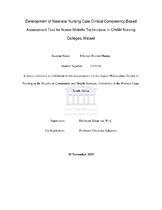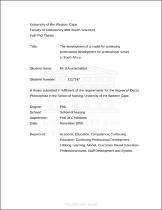Exploring the factors that impact on the validity of competency profile development: A case study
Abstract
The focus of this exploratory study was on competency profile development, specifically the factors impacting on the validity of its development. Given the paucity of research both nationally and internationally into the development of criteria feeding employment practices, as well as the conjectured enigmatic disjuncture between theory, which promotes the almost indispensability of job analysis, and organisational reality which attests to it seldom being performed or performed in a way which would satisfy scientific standards, a qualitative enquiry and a two tiered research design was developed to explore this phenomenon. Through excavating documentary data, the first phase of research intensively explored the work of the City of Cape Town's Competency Framework Team, their particular job analysis processes and their methodology for developing a competency profile for a single incumbent position, namely that of the City Manager's position. The medium of the case study allowed the reader to enter the world of a pulsing organisation and witness such researchers' dilemmas as contemplating whether there is a standard recipe for competency profile generation, the factors influencing choice of methodology, judgment around the relevancy of competencies developed to lead the change process, accurately responding to and managing dramatically skewed samples, the types of interventions to design, etc. The three key results from this phase of research confirmed that: the complexity of change within the City of Cape Town, as well as the types of decisions the various HR functions had to make on the basis of the profile, influenced decisions on how to profile and which methods to use; that stakeholders actively shaped the design and understanding of the particular components of the competency profile as they bring human volition to the areas of challenge arising within the organisation; and on the issue of whether racial composition of a sample was anticipated to have an effect on the competencies generated, it was clear that is not possible to ascertain whether the differences noticed in the behavioural repertoire of an individual are as a function of race or a myriad of other competing variables. The second phase of research studied the behavioural competencies elicited from a sample of Chief Executive Officers when using different job analysis methods to develop these competencies. The results confirmed that the distinctive features of a job analysis method selected or developed may impact on the behavioural competencies generated. These results not only sensitise practitioners to the role of methodology in influencing the derivation of competencies, but also to the many variables within, as well
as between chosen methodologies, and to the reality that choice of methodology may influence the degree of confidence with which one interprets the results attained. The study concluded that despite this being a case study, limiting the conclusiveness and generalisability of its findings, the facets of the phenomenon of competency profiling illuminated may have much salience for the art and practice of
profiling in general, for users and developers of job analysis processes, instruments, and leadership models, as well as practitioners entrusted with organisational design and redesign.
Related items
Showing items related by title, author, creator and subject.
-
Development of neonatal nursing care clinical competency-based assessment tool for Nurse-midwife technicians in CHAM nursing colleges, Malawi
Phuma, Ellemes Everret (University of the Western Cape, 2015)Literature has shown that Malawi is experiencing a shortage of qualified healthcare providers, with the greatest burden on maternal and neonatal health. The majority of health service providers are Nurse-Midwife Technicians ... -
Competencies for successful use of social online simulation games within organisational leadership development
Grove, Wouter Johannes (University of the Western Cape, 2014)The humble Pong arcade game at the corner store ignited a fundamental culture shift in the 1970s and it is increasingly gaining momentum. A generation of gamers is already permeating organisations. The socio-cultural ... -
The development of a model for continuing professional development for professional nurses in South Africa
Arunachallam, Sathasivan (University of the Western Cape, 2009)Comparative analysis of the CPD systems internationally and nationally revealed that CPD is mandatory for some whilst for other countries it is compulsory, but not mandatory for licensing purposes. Licensing occurs on a ...




